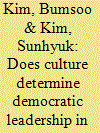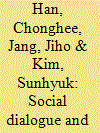| Srl | Item |
| 1 |
ID:
123027


|
|
|
|
|
| Publication |
2013.
|
| Summary/Abstract |
Scholars who believe that democratic leadership varies depending on culture often argue that because of the legacy of Confucian culture, East Asia favors directive leadership. However, based on our case study of South Korea during the Roh Moo-hyun presidency (2003-2008), we argue that democratic leadership varies depending on the political situation, regardless of the society's given cultural traditions. In a society, what we call "appropriate leadership" has more to do with political rather than cultural factors.
|
|
|
|
|
|
|
|
|
|
|
|
|
|
|
|
| 2 |
ID:
064884


|
|
|
| 3 |
ID:
076622


|
|
|
| 4 |
ID:
103191


|
|
|
|
|
| Publication |
2010.
|
| Summary/Abstract |
This paper analyses the sweeping changes in industrial relations in South Korea that have taken place since democratisation in 1987, which gave workers the right to organise themselves, and critically reviews the development of social dialogue since the financial crisis of 1997. A number of international labour specialists have maintained that social dialogue plays an important role in enhancing economic restructuring and the stability of industrial relations in order to compete in a global economy. Contrary to the positive assessment of social dialogue, the paper argues that the Korean Tripartite Commission has not reduced the antagonism between unions and employer organisations due to the influence of embedded, state-led economic development. The financial crisis of 1997 merely provided a catalyst to propel the 'historic compromise' of February 1998, without creating effective institutional arrangements to maintain social dialogue. It is worth noting that the uncertainty of social dialogue results from the inability of the Korean Tripartite Commission to encourage employers and workers to trade off wage restraint for job security in the context of a lack of social welfare protections. The paralysed Korean Tripartite Commission provides fertile ground for reflecting on the complex relationship between social dialogue and institutional arrangements.
|
|
|
|
|
|
|
|
|
|
|
|
|
|
|
|
| 5 |
ID:
114817


|
|
|
|
|
| Publication |
2012.
|
| Summary/Abstract |
This article examines prospects for solidarity, defined as an ethos of collective responsibility that works across a political community's normative values and policy decisions, as a unifying idea that can inspire and promote steps toward regional political community across East Asia. Just as the European Union's (EU) founders and its past and present visionaries have appealed consistently to an inclusive, transnational model of solidarity in framing and pursuing European integration, notions of solidarity also contain important affinities with prospects for building an East Asian community. First, the paper examines how the idea of solidarity has evolved in European political thought and especially how solidarity has emerged repeatedly as one of the important concepts throughout the political development of the EU. Then, the paper turns to East Asia and considers the relevance of solidarity as an important principle in aspirations and endeavors toward the creation of an East Asian community. We base our analysis upon a variety of sources, including statements and speeches from key political actors, scholarly books and articles, and news accounts and commentaries. We illustrate how earlier manifestations of solidarity in East Asia have often been cast in ways that set the region apart from the rest of the world and have framed particular groupings of Asian countries in opposition to the West, and we argue that a redeployment of solidarity is needed in East Asia that instead emphasizes an ethos of collective responsibility among the principal national actors and external stakeholders within the region and beyond. In contrast with interpretations that suggest that the conditions for developing East Asian community are inescapably distinct from the circumstances in Europe during the second half of the twentieth century, we argue that the idea of solidarity has great potential to advance regional collaboration in East Asia.
|
|
|
|
|
|
|
|
|
|
|
|
|
|
|
|